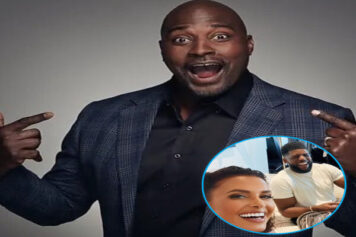Williams is now a certified financial planner who owns her own business where she helps all sorts of people get their money right.
When I hear the phrase “Black Girl Strength”, I think of words like “fast”, “built” and “resilient”.
Of course, three-time Olympic medalist Lauryn Williams is all of these things: Between track and field and bobsled, she was the first woman to win medals in both the Winter and Summer Games. But that’s not why I wanted to talk with her.
Williams is now a certified financial planner (CFP) and owns her own business called Worth Winning, where she helps all sorts of people get their money right.
I think financial savvy is a form of strength in and of itself and I wanted to know how Williams got to where she is now. The other day, I got to chat with her about her journey and get her perspective on how women of color are thriving in the current economy.
https://www.instagram.com/p/Bpzw-EmH1Bj/
So you went from all-star Olympian to a financial advisor. Help me connect the dots here because you don’t see people make that transition very often. How did your interest in finance begin?
Well, growing up I really loved math and I really loved money, you know? I have always had an entrepreneurial spirit. I sold candy in middle school and high school as a hustle. I worked weekends at a catering company. The day I turned 16, I got a job. There was nothing worse to me than having to go to my parents and ask if I could get $10. I was out there to get that money and do what I wanted to do.
So I picked [to study] finance at 17 because I thought it looked dope.
I’ve heard you say before that Olympians are their own entrepreneurs in a way. They have to really know how to market themselves … hire the right people to help them manage their lives. So your career path is actually quite fitting for you. But do you think there are a lot of athletes out there who don’t know they are business owners?
I think there are a bunch of athletes who have no idea what it means to be a business owner or what it means to organize your finances. Taxes can be a problem for athletes who are 1099 employees.
If you’re an Olympic athlete, you not an employee of the United States Olympics Committee. Whatever compensation is provided to you is provided to you on an independent contract basis. And at the end of the year, you will have to pay taxes on that. And it’s hard for someone who’s young and has had everything taken care of for them up to that point to understand that. There’s no rookie symposium where they are going to explain all of this to you.
https://www.instagram.com/p/Bs8zeGRHYs_/
I mean, I went the traditional “high-school-to-bachelors-to-masters” route and still no one had explained that to me.
Haha, well luckily for track athletes, USA Track and Field now has an info session to educate people and I’m really proud of them for doing that. I think it’s really important that an athlete realizes that their job is a lot more than just showing up and competing. Part of their job is their responsibility around the amount of money they are earning and making the most of those opportunities so that they’ll have a better life during and after sport.
What was it like for you when you signed your first contract?
I was 20 years old when I became a professional track and field athlete. I was a junior in college and my only goal that year was to win the national championship. It was very simple. But not only did I win the national championship, but I also ran the second-fastest time in the world. So immediately, I needed to turn my focus to the Olympics because people started approaching me all of a sudden. I ended up making over $200,000 a year at 20. I could have never guessed that was going to be my life.
Wow, that’s amazing … but probably overwhelming, no?
Yeah, I didn’t know what do I do. I was a finance major, but I still didn’t know anything about personal finance. I learned about hedge funds, the market, and economics … But I had a lot of questions about how to create a budget!
I was also navigating the world of track and field. I had this nice base contract, but then there were bonuses and incentives. You can get an increase in your salary if you got a medal at the Olympics. It could be reduced if I didn’t perform well. That created some new pressure around competing that I mentally had not prepared for.
Judging from your medals, it seems like you handled it just fine. But was there ever a time when that pressure felt more intense?
I think later on in my career, after having made some financial mistakes and realizing I couldn’t run forever … At some point, you start to feel less like an invincible superhero and realize that there’s a very definitive timeline your ability to earn like that.
What sorts of financial mistakes did you regret the most?
I purchased a house that was way too big for my britches. Buying a house was actually some bad advice from one of the financial advisors I hired.
The house was $800,000. I lived in it. Loved it. Had some great experiences there. But that mortgage was not going to be sustainable over 30 years. I could make the payments during the height of my career, but I wasn’t going to pay it all off unless I got a job that was going to earn in a much more simpler way. Someone should have sat me down and talked about it.
And yet, despite all of that you bounced back just fine.
Yeah when those mistakes happen, it’s about not wallowing in the moment. When you’re an athlete you understand that. Sure, you lose the game and the world is ending in those five minutes. But then the game is over, you still got practice tomorrow, you got another game next week and you gotta decide to look forward.
https://www.instagram.com/p/BtBfNKMH-k_/
So I know you work with a lot of women of color and their financial literacy. What do you see is the biggest challenge for our generation?
One of the things that I’ve bumped into is the pressure that comes when the woman is the main breadwinner. Sometimes the man feels insecure and she can become super bossy around money, which creates this kind of division. Or: She’s super submissive because she’s trying not to make the man feel insecure. So in those cases, I help them manage those money emotions.
I mean it’s interesting that you bring that up since I read an article a few years ago that said black women are earning more degrees than ever before — unfortunately, more so than black men, which could put them in the position of being the breadwinner.
Yeah. I’ve also found that women of color who are the breadwinners often face more pressure from their family because they are frequently the first one to graduate college. The pressures that they feel from family to help them support their needs and wanting to be giving, wanting to be the nurturer, wanting to give back to the people who helped them get where you are, sometimes allows people to get back into the same financial hole they came from.
When they are heading down that road, I always tell them: If you have a million dollars and give a million people one dollar, everyone’s got a dollar and you have nothing. Who’s really served by a million people having one dollar?
So black women are earning more degrees than ever before. That’s dope, right? But how does that look now on a financial level? Are we supporting ourselves or are we still sacrificing ourselves?
Well, student loans are real, and so even though we are graduating more and we are getting in higher positions, we are working our tail off to get to the next level. And without financial knowledge, we’ll always feel like we have to look and play the part.
We’re dressing the part. We got our hair done. We got your makeup done. All of that stuff costs money and you’re keeping that student loan payment as low as possible when you should be in fact trying to pay it off. Or you could be staying at home with your mama for a year to just go ahead and knock it out.
Instead, we pretend like it doesn’t exist and it exacerbates the problem. Then something else comes along that you didn’t expect that’s creating more stress for you in your life and not allowing you to be financially free.
So then what’s the best advice you’d give a young black person in America just trying to make it?
Have a discussion with someone and find yourself a mentor.
They may not know how to budget, but hopefully, they’ll help you a good financial coach. Having those discussions with someone is so important because if we don’t have a discussion in the first place, our ignorance is what is going to cause us to make mistakes. Once we make a mistake, that shame is going to reinforce the fact that we can’t discuss anything and you start a vicious cycle that does not allow you to excel. So: Have money discussions and find yourself a mentor!



